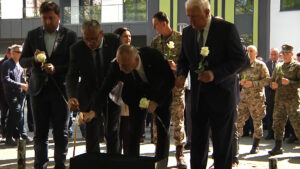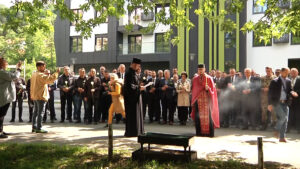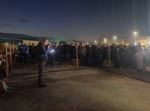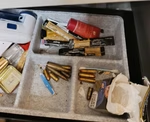RS delegation marks anniversary of the death of JNA soldiers in "Tuzla column"
The 32nd anniversary of the Battle of Brcanska Malta, better known as the Tuzlan Column, was marked with delegations from Republika Srpska (RS) entity laying flowers and paying tribute to Yugoslav National Army (JNA) soldiers who died in Tuzla on May 15, 1992.
Oglas
Danijel Ekic, RS Minister of Labour and Veterans and Disabled Veterans, said that the "Tuzla Column" was attacked after "an agreement was reached on April 26 in Skopje for their withdrawal."
"51 soldiers were killed, 78 were wounded, and 44 were arrested and captured. No one was held accountable for this crime," he said.
Bosko Tomic, representative of BiH Presidency member Zeljka Cvijanovic, stated that "if the agreements are not respected, a disaster will occur".
"The misfortune happened here and in Dobrovoljacka Street in Sarajevo, and we cannot take it back. We should demand that those who committed the crime and violated the agreement be held accountable. Everyone in their ethnicity should demand responsibility for all those who committed crimes and they should answer before the court. Until we come to an agreement, there will be no joy in this country. There is enough space for us all in this country," Tomic said.
The mayor of Bijeljina Ljubisa Petrovic stated that they came with a message of peace and to pray for the salvation of the souls of those who "died in a heinous way".
"Everything was prepared, that's what a large number of documents say, a planned crime without punishment. It was also an introduction to the exodus of the Serb people from the territory of Tuzla Canton. We need to save ourselves from oblivion, but also warn that such and similar sufferings never happen again. That no mother should cry over her child's grave," Petrovic said.




N1 | N1
Više
N1 | N1
Više
N1 | N1
Više
According to the “Truth, Justice, Reconciliation” Foundation, 33 members of the column were killed. Information from the Republika Srpska (RS) entity Center for War Research, War Crimes and RS Search for Missing Persons say that 54 people died.
In 2016, the Court of Appeal in Belgrade acquitted BiH police officer Ilija Jurisic of war crimes because there was no evidence that he ordered an attack on a column of Yugoslav National Army (JNA) soldiers in Tuzla in 1992. This decision changed the first-instance verdict of the War Crimes Department of the High Court in Belgrade, which sentenced Jurisic to 12 years in prison.
The International Court in the Hague said in its verdict that the events in Tuzla were not a war crime, and the Court of Appeal acquitted Ilija Jurisic of all responsibility.
Kakvo je tvoje mišljenje o ovome?
Učestvuj u diskusiji ili pročitaj komentare
Oglas
Kakvo je tvoje mišljenje o ovome?
Učestvuj u diskusiji ili pročitaj komentare
Oglas





 Srbija
Srbija
 Hrvatska
Hrvatska
 Slovenija
Slovenija



























































